Brief

A month ago, we took a hard look at what happened to the private equity industry in the wake of the 2008–2009 global financial crisis. In the absence of clear data, we knew it would shed light on what impact the Covid-19 crisis might have on investments, exits, fund-raising and returns.
Now the data through April is in, and it’s not pretty.

Macro Surveillance Platform
For more detail on the business implications of coronavirus from Bain’s Macro Trends Group, log on to the Macro Surveillance Platform. Learn more about the platform >
The industry is already experiencing a sharp drop-off in global buyout and exit transactions. Most signposts suggest we should expect the same in fund-raising and returns as the year unfolds. A record level of dry powder in the market continues to pressure funds to find and do deals. But with markets roiled by volatility and cash-strapped companies struggling just to figure out what demand is going to look like in the coming year, the mix of opportunities has shifted substantially. Here’s what’s happening in each market category.
Investments
The number of global buyout transactions fell 60% from January to April and is now trending at around a third of the five-year monthly average (see Figure 1a). The market forces remain as we described them last time: general partners (GPs) have largely been focused on stabilizing portfolios, sellers are reluctant to unload their companies amid volatility and lenders are busy tending to existing loans, while still trying to figure out how to assess risk amid deep macroeconomic uncertainty. Although banks aren’t frozen as they were during the last downturn, leveraged lending has fallen 80% this year (see Figure 1b).
At the same time, however, there’s never been more dry powder in the market available to do deals. In April, private equity funds were sitting on a record $2.6 trillion in unspent capital (see Figure 1c). As funds search for places to put that money to work, the most obvious place (for GPs with the mandate) has been on the debt side of the capital structure. While more than 90% of leveraged loans were trading above 90 as a percentage of par in early March, the market reversed itself as the pandemic took hold, sending more than 90% of them below 90 as a percentage of par by late March. The market has recovered somewhat, but at the end of April, around 40% of issues were still trading below 90 (see Figure 1d).
Figure 1 (slideshow): 1a
The number of buyouts has fallen precipitously in the wake of Covid-19, mirroring the deep drop during the global financial crisis

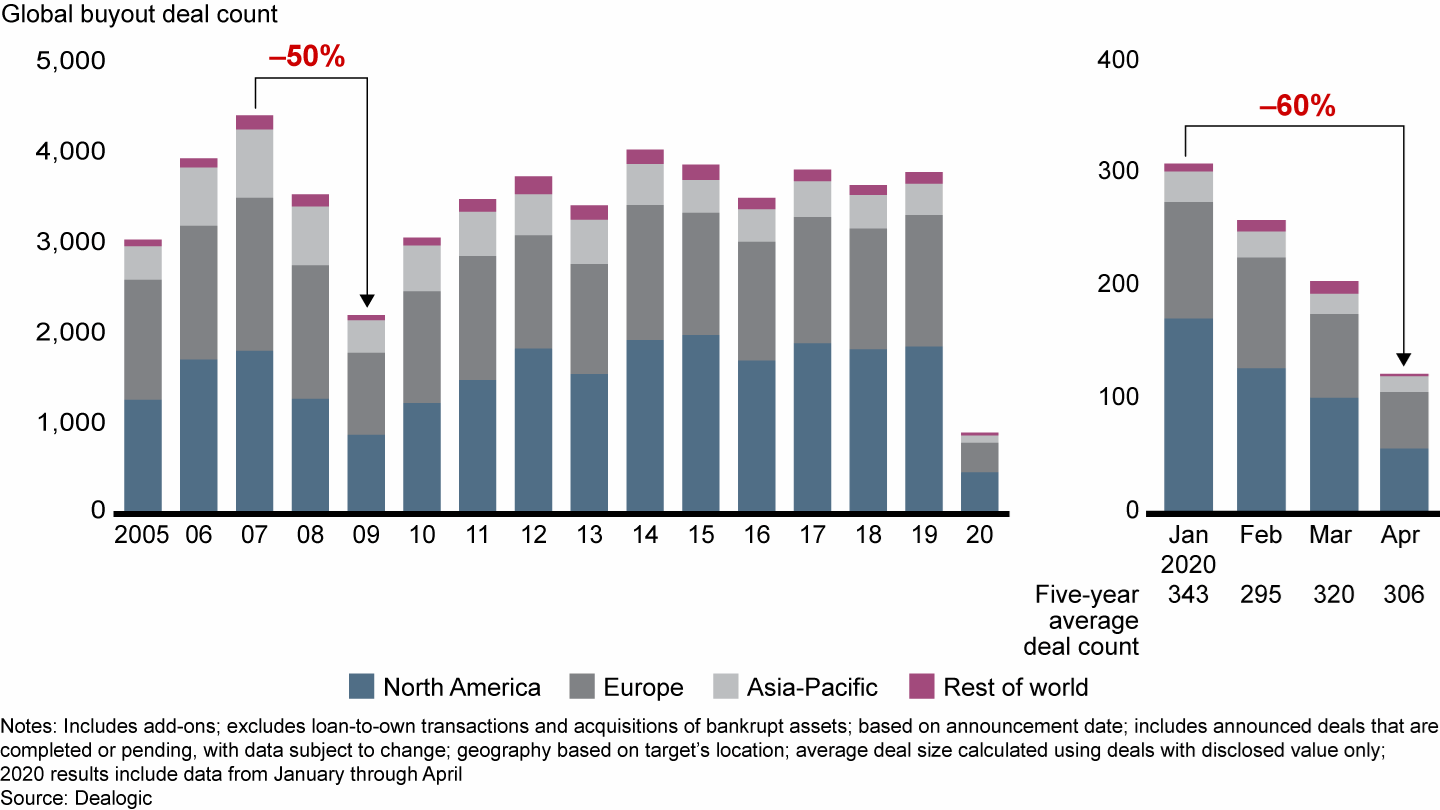
Figure 1 (slideshow): 1b
High-yield lending for new deals has stalled as banks pull back amid market uncertainty

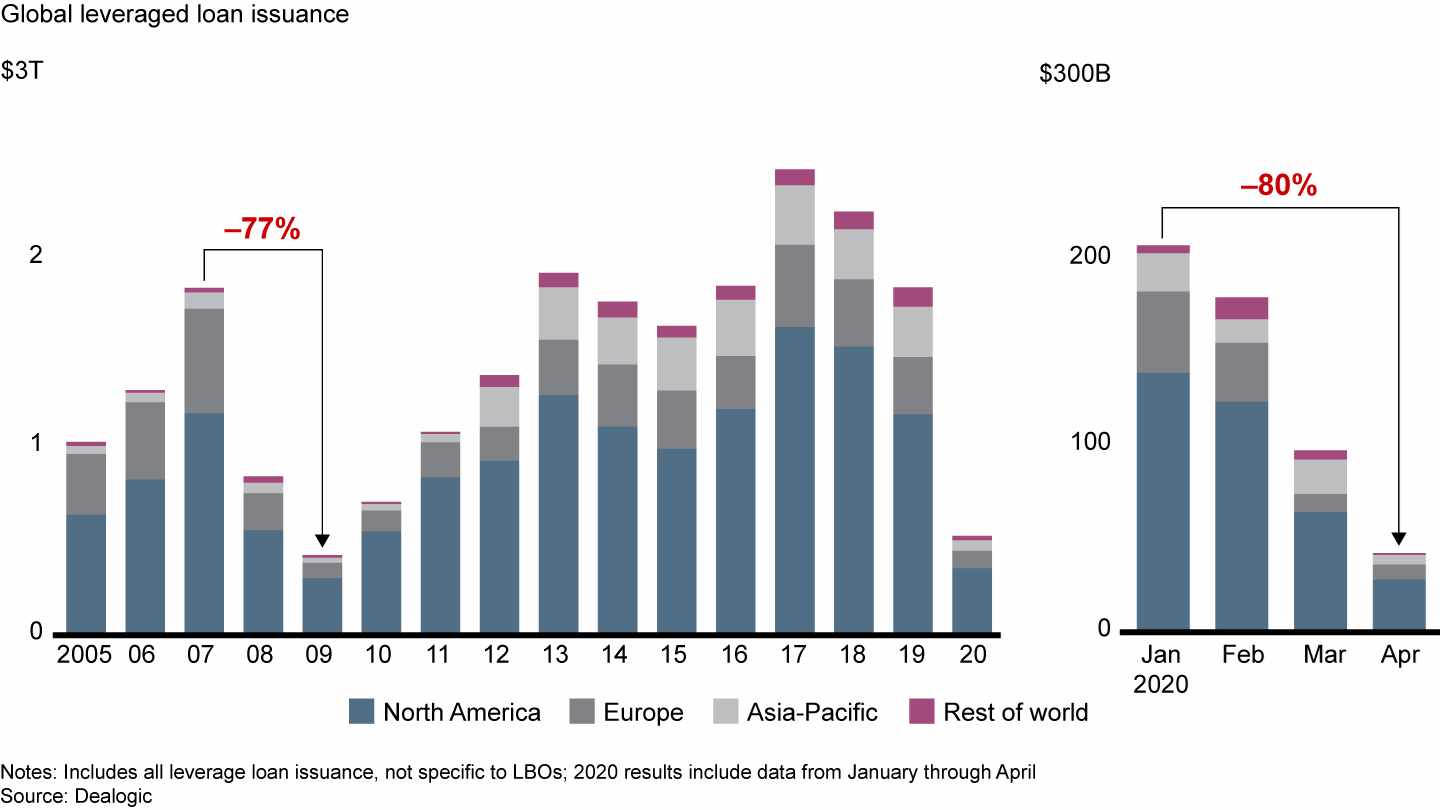
Figure 1 (slideshow): 1c
Funds of all types have a record amount of unspent capital waiting to be put to work

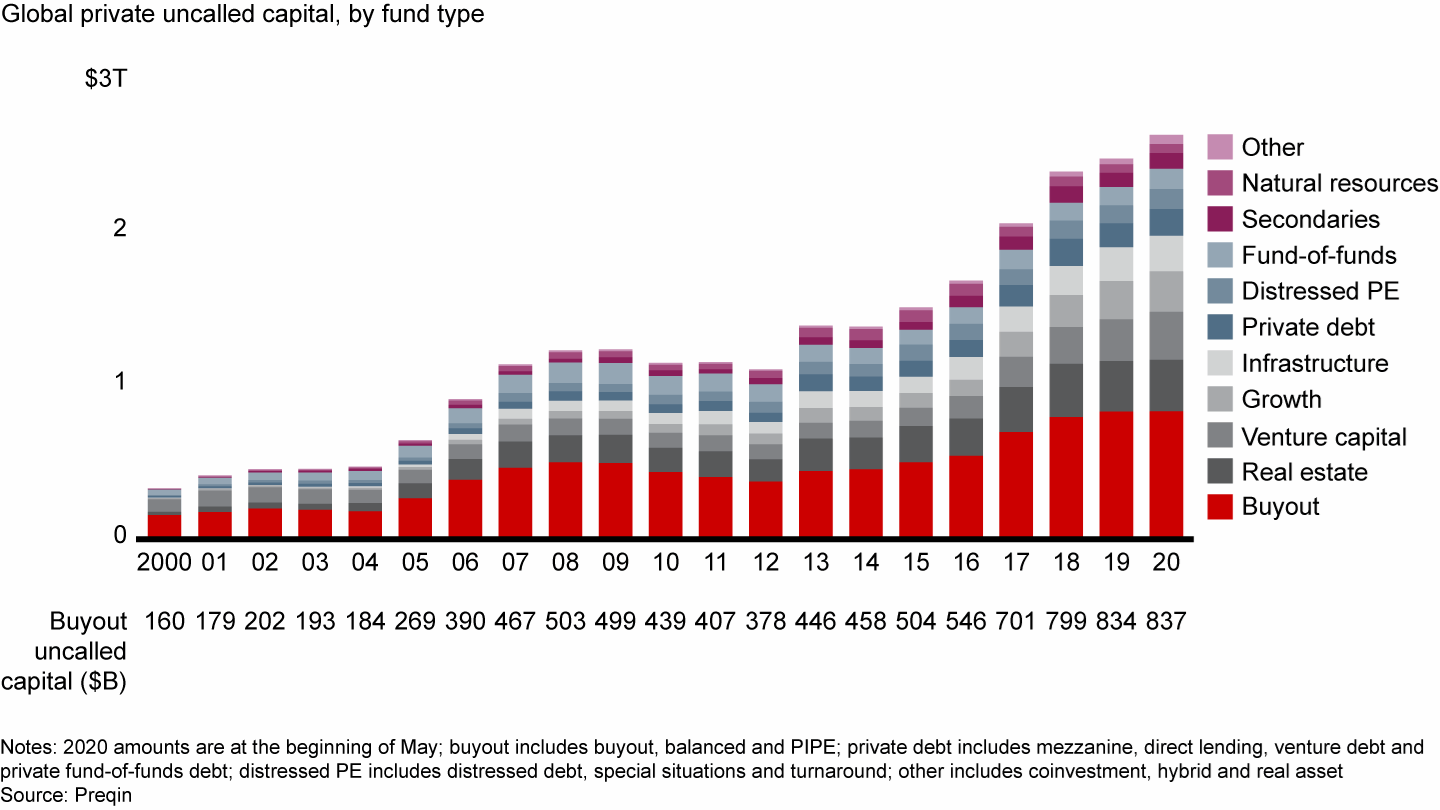
Figure 1 (slideshow): 1d
Subpar loans soared in late March and continue to signal opportunity for funds that can invest in debt

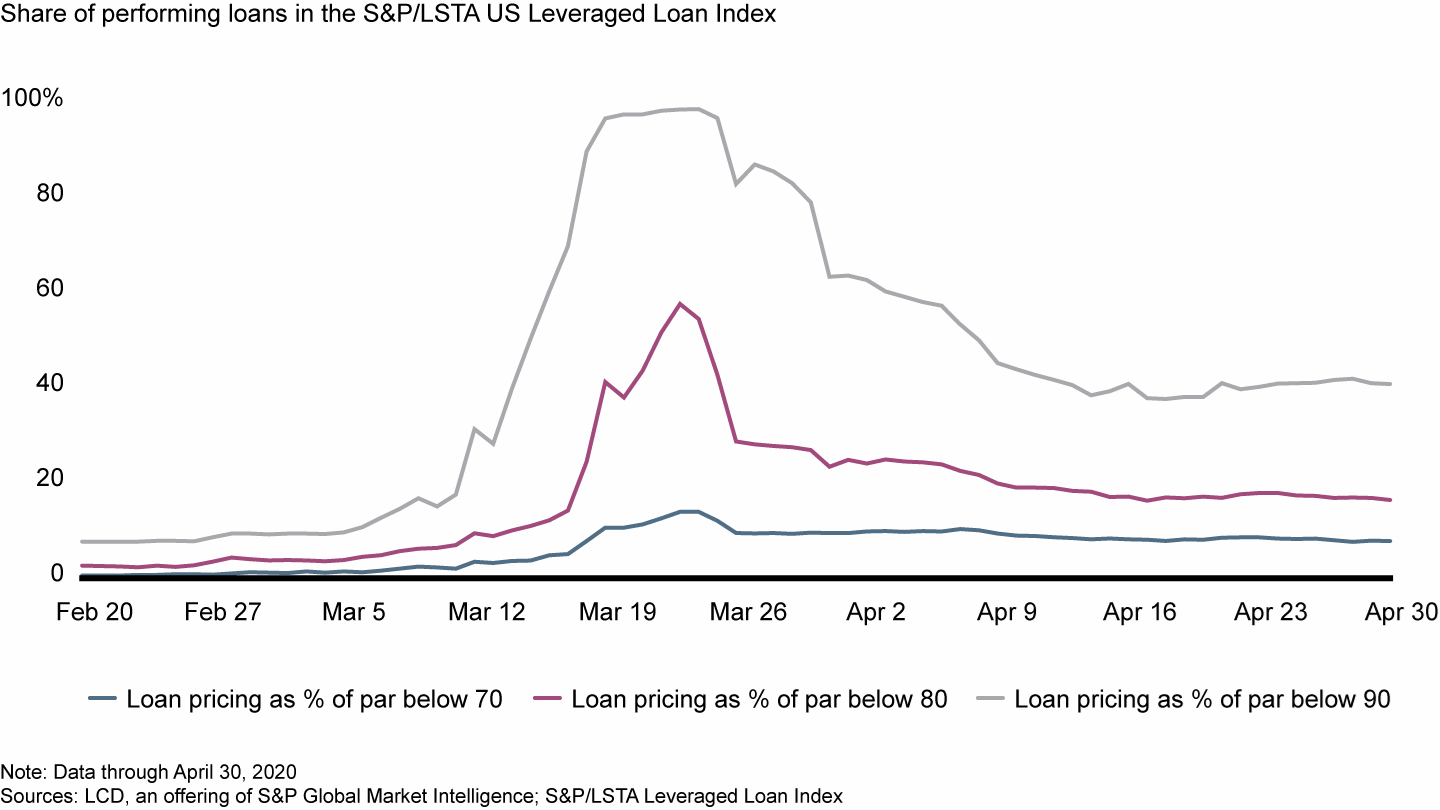
Debt specialists have been pressing on various strategies—loan-to-own, distressed investments with no control (trade in/trade out), direct lending, etc.—and using analytics to get a better handle on fundamental operating strength. Equity funds, meanwhile, are also getting creative as they pursue various kinds of structured equity deals, ranging from investments in preferred stock and warrants to private-investment-in-public-equity (PIPE) transactions. PIPEs are bespoke investments in newly issued tranches of equity that can help public companies raise cash quickly when banks are reluctant to lend. PE sponsors and hedge funds, among other financial investors, have invested more than $8.6 billion in US PIPE investments this year through May 12, including the $400 million investment in publicly traded Outfront Media Inc. by Providence Equity Partners and Ares Management Corp.
Exits
The number of exit transactions has fallen 72% since January (see Figure 2). At the moment, funds are waiting for smoother sailing before selling anything they don’t have to. Indeed, 83% of GPs surveyed by Investec recently said they didn’t expect to exit any of their portfolio companies over the next 12 months. That could change rapidly, however, as soon as market conditions improve. Unlike during the global financial crisis, when the majority of companies in PE portfolios had just been bought, GPs today are coming off many consecutive years of strong dealmaking and are sitting on assets that they would be expected to sell soon in a normal market. They won’t exit if the price isn’t right. But the aging pool of assets will likely accelerate activity once the rebound takes shape.
Figure 1 (slideshow): Figure 2
Exit activity has also fallen off a cliff, as owners hold onto assets through the crisis

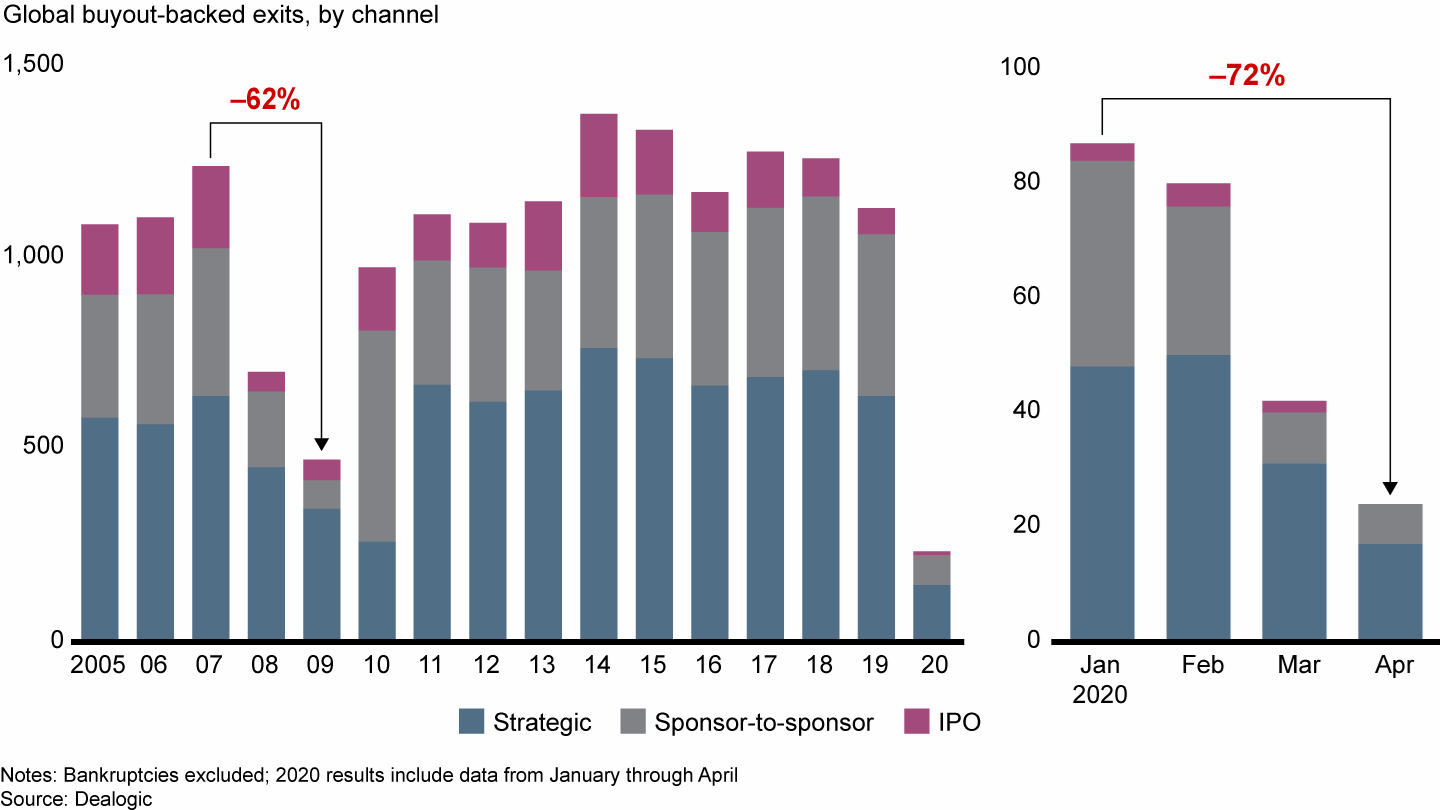
Fund-raising
Through April, fund-raising totals have actually been pretty good. Globally, funds of all types raised $287 billion over the year’s first four months. On an annualized basis, that would be over $860 billion by the end of 2020, right in line with recent years (see Figure 3a). But what we’re seeing is a bit of a mirage. Funds don’t hold a final close until the last dollar is in the door. That means that the bulk of the money raised this year actually reflects efforts that preceded the Covid-19 crisis. Other indications suggest that limited partners (LPs) will surely trim the amount of capital they invest with PE funds over the next eight months.
Only around one-third of LPs surveyed by Campbell Lutyens said in April they will continue with “business as usual” when making new fund commitments (see Figure 3b). The rest are putting commitments on hold, proceeding only with “re-ups” but not adding new GP relationships, or proceeding with opportunities in process, but not adding to the pipeline. As we noted in the previous update, the reasons are mostly structural. One factor is the “denominator effect,” which skews the proportion of different asset classes in an LP’s portfolio when markets are extremely volatile. Around 11% of LPs surveyed in early April by the Institutional Limited Partners Association (ILPA) said they were extremely concerned that the denominator effect would push them over their PE targets, limiting new allocations.
Figure 3 (slideshow): 3a
Fund-raising looks to be doing fine on an annualized basis, but closings to date reflect pre-Covid activity and totals will likely fall as the year plays out

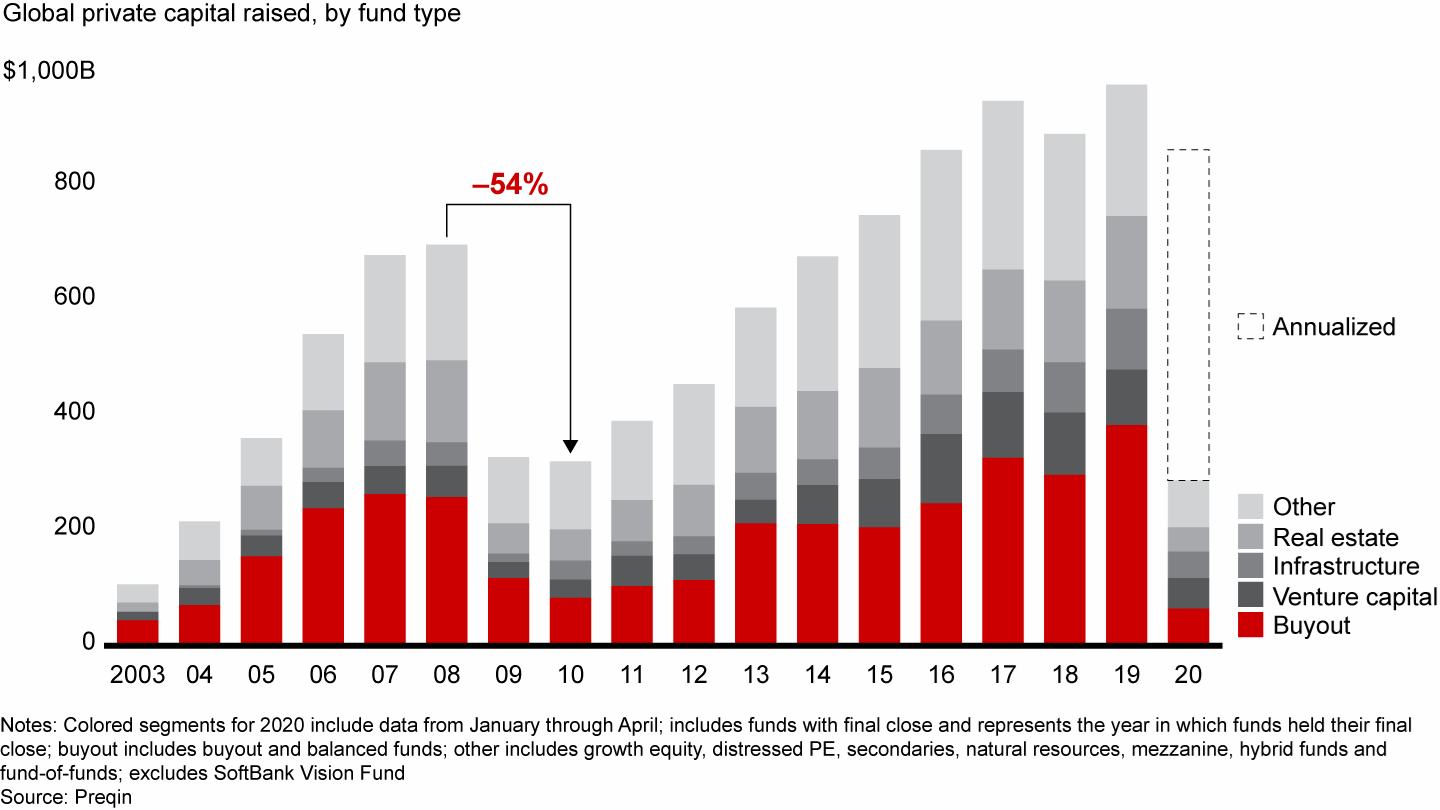
Figure 3 (slideshow): 3b
Limited partners are slowing their pace of new commitments, making for a more challenging fund-raising environment

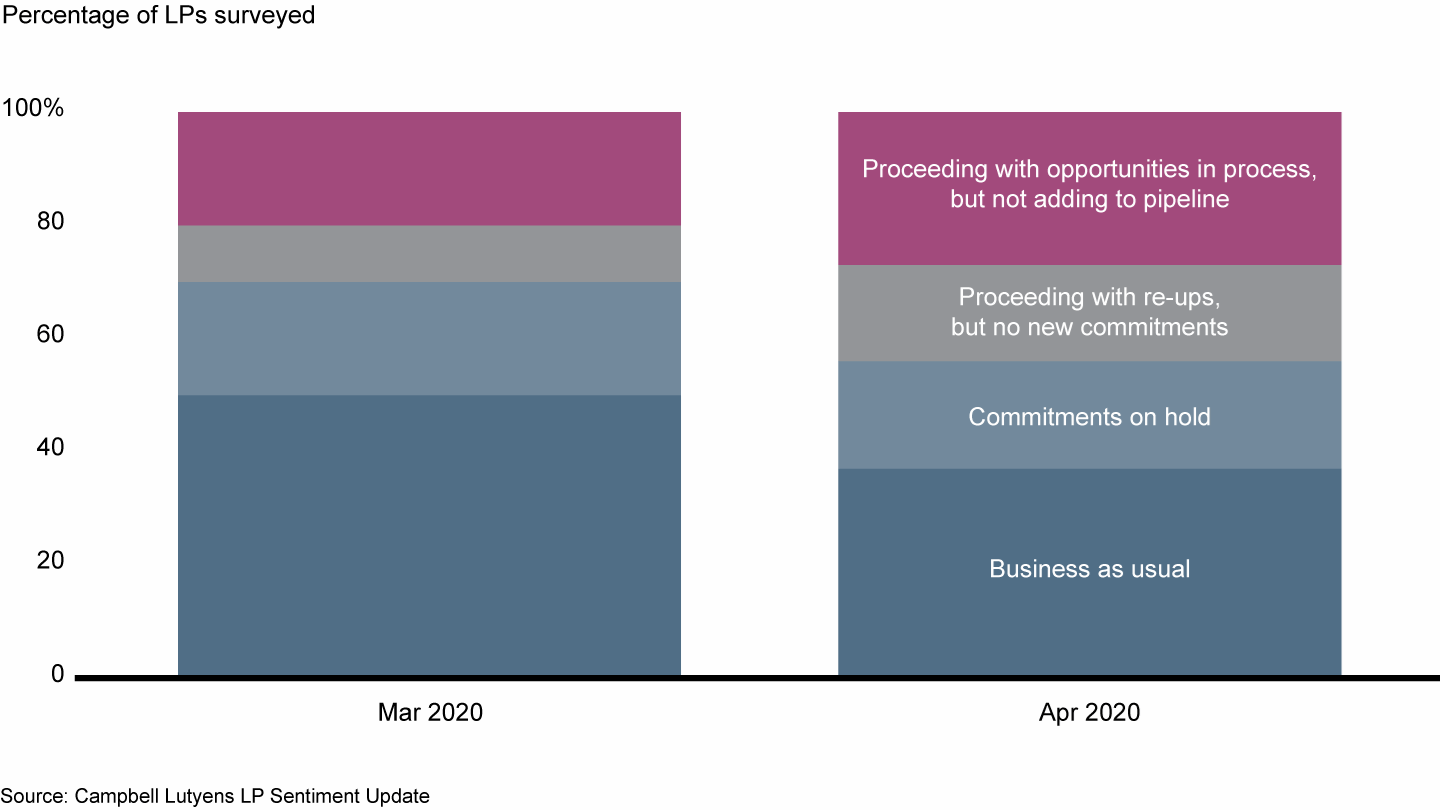
An even bigger factor is cash flow. Despite the drop in new deal flow, 60% of LPs in the ILPA survey indicated that capital calls had increased since the Covid-19 crisis began. GPs continue to invest in portfolio companies either to shore them up amid the crisis or to take advantage of chances to go on offense. They’re also swapping subscription lines of credit for equity and, in some cases, putting money to work in debt or distressed opportunities.
An interesting trend worth watching is how these cash flow issues get resolved. To the extent that portfolio companies need capital and LPs are pressed to provide it amidst a downturn, other sources of capital will likely step up. These arrangements can take many forms, from asset sales to full fund recapitalizations. They could be structured debt deals—where GPs borrow at the fund level to generate new capital, secured by portfolio assets—or structured equity deals, where the GP receives capital from secondary sources to support the portfolio or accelerate distributions to LPs. The system has ample capital, and it will inevitably flow to where it’s needed.
Returns
Returns lag in a downturn because mark-to-market calculations aren’t immediate. But the majority of both LPs and GPs in the Campbell Lutyens survey said they expect to see write-downs of at least 15% in funds’ first-quarter valuations (see Figure 4a). Funds typically try to get the bad news out of the way as quickly as possible, so they take write-downs in bulk. But it’s also difficult to value companies in this environment, given the disruption to company cash flows, market volatility and the lack of comparable transactions.
The pattern coming out of the downturn, however, is pretty clear. Deals made shortly before the downturn tend to do less well than those made during and after the downturn (see Figure 4b). The best way to maintain strong returns long term, in other words: Stay on offense.
Figure 4 (slideshow): 4a
Fund managers and their investors are both bracing for big write-downs in the first quarter

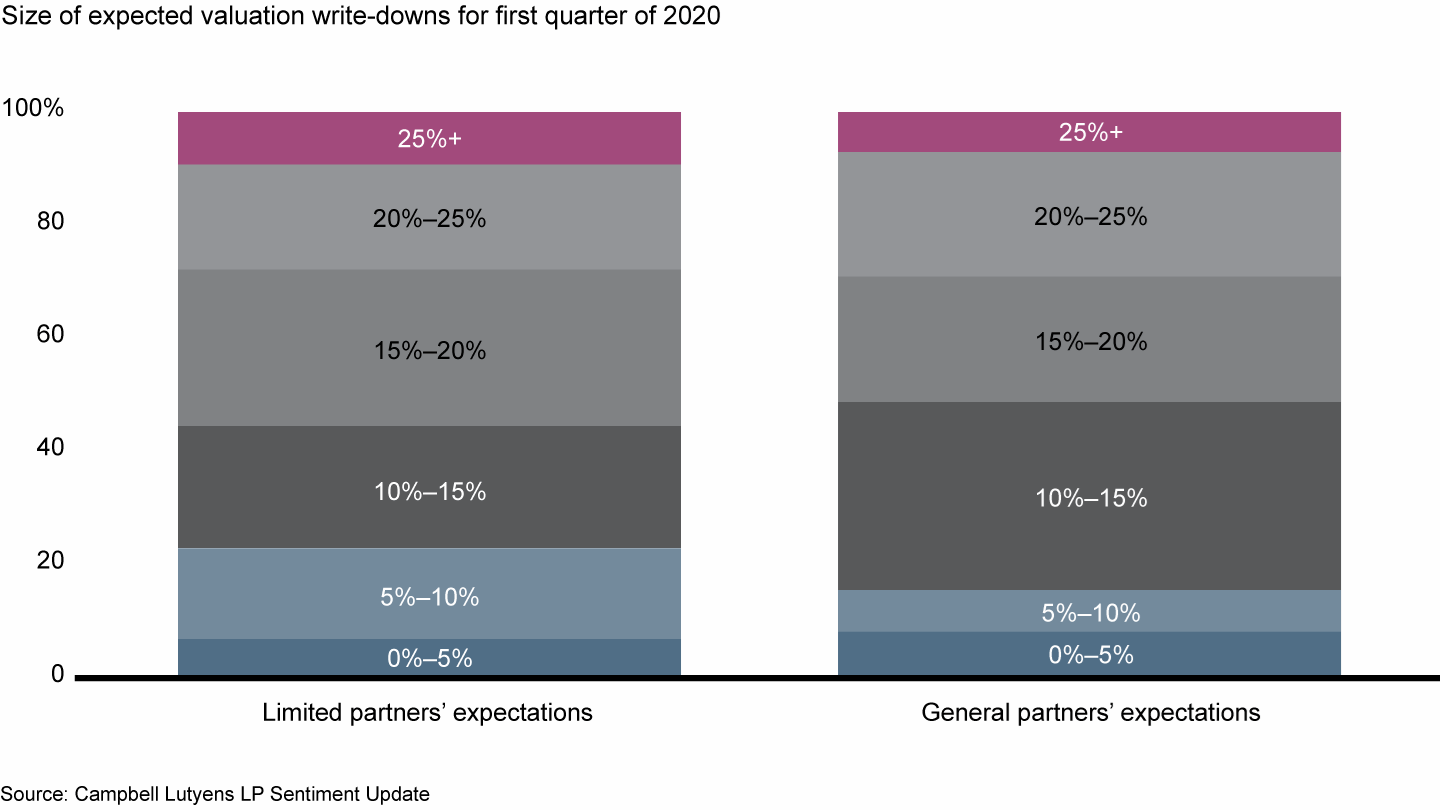
Figure 4 (slideshow): 4b
If history is a guide, investments made right before the Covid-19 crisis may feel pressure, but investments made near the bottom will do well

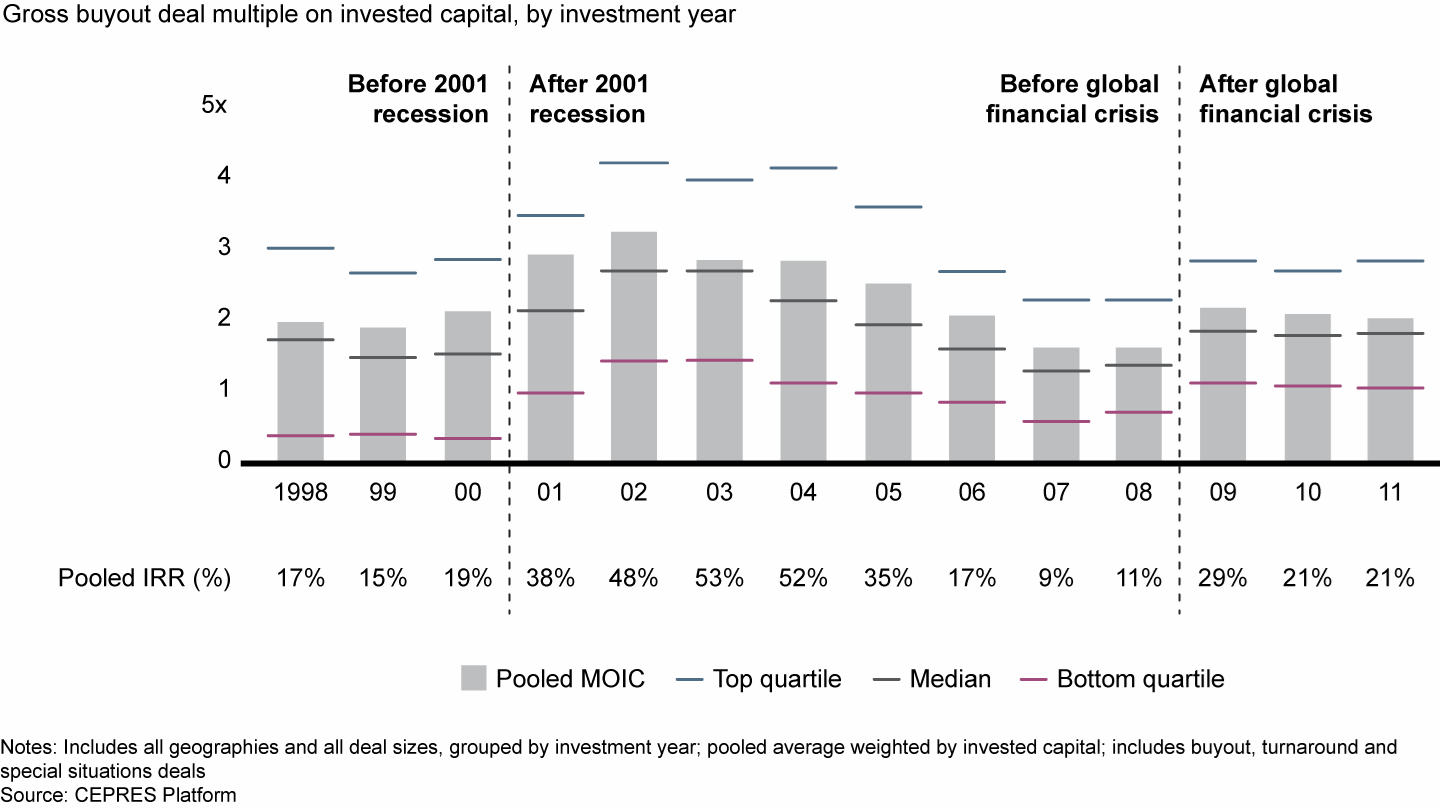

Coronavirus
The global Covid-19 pandemic has extracted a terrible human toll and spurred sweeping changes in the world economy. Across industries, executives have begun reassessing their strategies and repositioning their companies to thrive now and in the world beyond coronavirus.